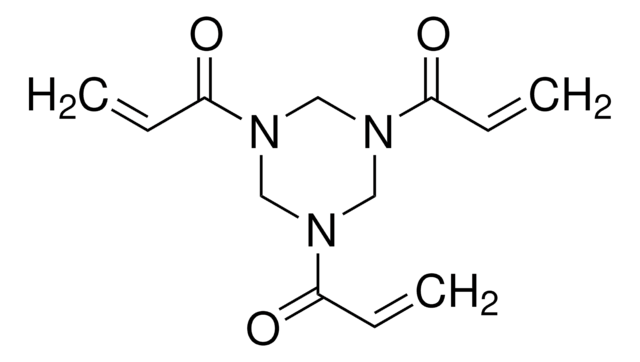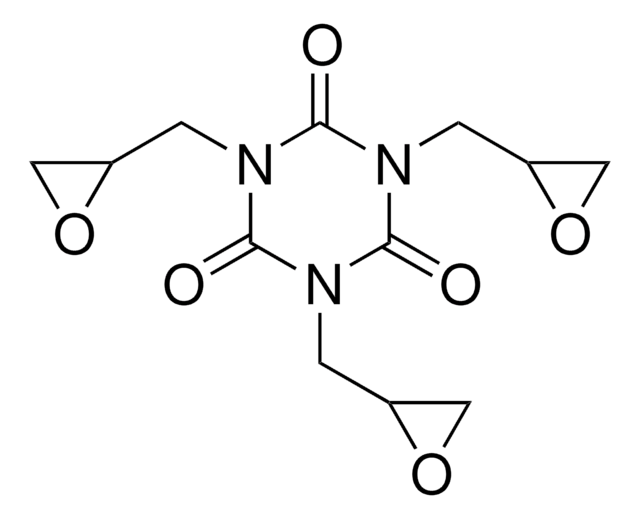731250
Tris[2-(3-mercaptopropionyloxy)ethyl] isocyanurate
Synonym(s):
3TI
Sign Into View Organizational & Contract Pricing
All Photos(1)
About This Item
Empirical Formula (Hill Notation):
C18H27N3O9S3
CAS Number:
Molecular Weight:
525.62
EC Number:
MDL number:
UNSPSC Code:
12162002
PubChem Substance ID:
Recommended Products
refractive index
n20/D 1.538
density
1.333 g/mL at 25 °C
storage temp.
2-8°C
SMILES string
SCCC(=O)OCCN1C(=O)N(CCOC(=O)CCS)C(=O)N(CCOC(=O)CCS)C1=O
InChI
1S/C18H27N3O9S3/c22-13(1-10-31)28-7-4-19-16(25)20(5-8-29-14(23)2-11-32)18(27)21(17(19)26)6-9-30-15(24)3-12-33/h31-33H,1-12H2
InChI key
CFKONAWMNQERAG-UHFFFAOYSA-N
Signal Word
Warning
Hazard Statements
Precautionary Statements
Hazard Classifications
Eye Irrit. 2 - Skin Irrit. 2 - STOT SE 3
Target Organs
Respiratory system
Storage Class Code
12 - Non Combustible Liquids
WGK
WGK 3
Flash Point(F)
Not applicable
Flash Point(C)
Not applicable
Choose from one of the most recent versions:
Already Own This Product?
Find documentation for the products that you have recently purchased in the Document Library.
Customers Also Viewed
Zhiqiang Wen et al.
Applied and environmental microbiology, 85(7) (2019-01-20)
Clostridium cellulovorans DSM 743B offers potential as a chassis strain for biomass refining by consolidated bioprocessing (CBP). However, its n-butanol production from lignocellulosic biomass has yet to be demonstrated. This study demonstrates the construction of a coenzyme A (CoA)-dependent acetone-butanol-ethanol
Ang Li et al.
Bioresource technology, 305, 123066-123066 (2020-03-03)
Clostridium diolis can efficiently utilize various inexpensive, renewable resources such as crude glycerol and lignocellulosic biomass hydrolysate to produce bulk chemicals and fuels. However, its study has been impeded by the lack of efficient plasmids electro-transformation techniques. In this study
Kamil Charubin et al.
mBio, 11(5) (2020-09-03)
Microbial syntrophy is universal in nature, profoundly affecting the composition and function of microbiomes. We have recently reported data suggesting direct cell-to-cell interactions leading to electron and material exchange between the two microbes in the syntrophy between Clostridium ljungdahlii and
Lei Li et al.
Biotechnology advances, 37(5), 730-745 (2019-04-06)
Industrial biotechnology is reliant on native pathway engineering or foreign pathway introduction for efficient biosynthesis of target products. Chromosomal integration, with intrinsic genetic stability, is an indispensable step for reliable expression of homologous or heterologous genes and pathways in large-scale
Yayun Wang et al.
Journal of basic microbiology, 58(5), 448-458 (2018-02-02)
Although Ruminiclostridium josui (formerly Clostridium josui), a strictly anaerobic mesophilic cellulolytic bacterium, is a promising candidate for biomass utilization via consolidated bioprocessing, its host-vector system has not yet been established. The existence of a restriction and modification system is a
Our team of scientists has experience in all areas of research including Life Science, Material Science, Chemical Synthesis, Chromatography, Analytical and many others.
Contact Technical Service







![Tris[2-(acryloyloxy)ethyl] isocyanurate](/deepweb/assets/sigmaaldrich/product/structures/254/494/1a620abc-8043-457f-92ec-87a959682438/640/1a620abc-8043-457f-92ec-87a959682438.png)


![Tris[3-(trimethoxysilyl)propyl] isocyanurate technical grade](/deepweb/assets/sigmaaldrich/product/structures/239/690/c24b2d6d-4580-41dd-a3ec-77f7fcb9caaf/640/c24b2d6d-4580-41dd-a3ec-77f7fcb9caaf.png)




